Comprehensive Guide to Avian and Exotic Animal Care
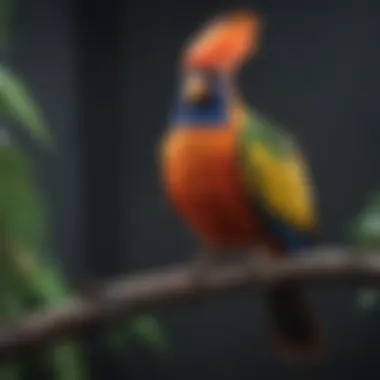
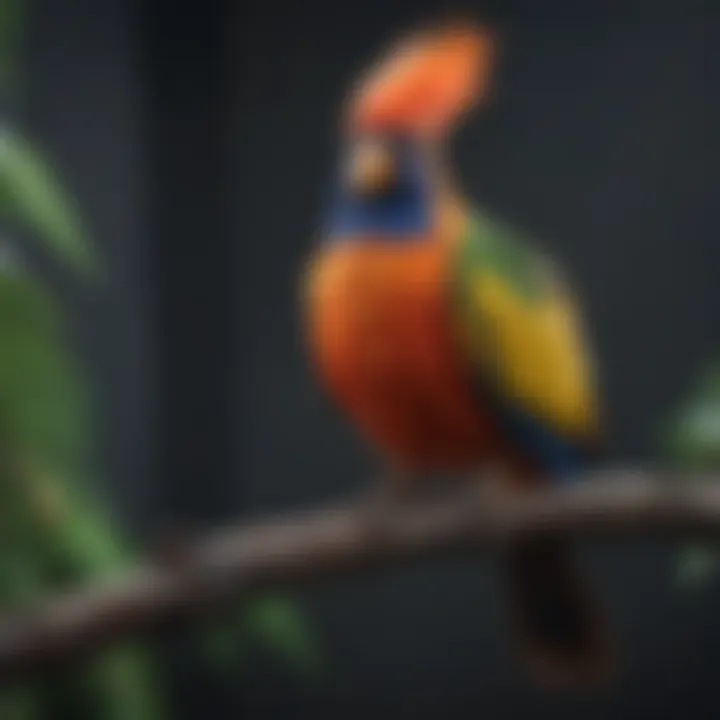
Intro
In the vast tapestry of pet ownership, one can often find themselves drawn to the colorful and fascinating world of avian and exotic animals. Birds, with their vibrant plumage and unique behaviors, can capture the heart of any animal lover. However, caring for these feathered friends goes beyond mere admiration. Understanding the specific needs of these animals is pivotal for ensuring their health and happiness. This journey into avian care reveals the intricate relationship between birds and their caretakers, touching on habitats, nutritional needs, and emotional well-being.
As we delve into the various aspects of avian care, it becomes clear that knowledge and attentiveness are key. Those who choose to share their lives with pet birds or exotic animals embrace not just companionship but a lifetime commitment. With this commitment comes a wealth of information to absorb, ranging from the fundamental basics to the more nuanced understanding of bird behavior and health.
Let's spread our wings and take our first step into the essential elements of avian care.
Avian Care Basics
When it comes to avian care, understanding the fundamentals is crucial. The more you know about your pet bird, the better you can cater to its specific needs.
Importance of Proper Nutrition
Diet is the cornerstone of a healthy life for pet birds. Just like humans, what birds eat plays a significant role in their overall health. A balanced diet typically consists of a variety of seeds, pellets, fruits, and vegetables. Remember, not all seeds are created equal—some can lead to obesity and other health issues. Incorporating fresh foods like kale, carrots, and apples into their diet offers the necessary vitamins and minerals.
Understanding Bird Species and Their Needs
Not every bird is the same. Different species require different care, and it's essential to identify the specific needs of your pet. For instance, parakeets often thrive in larger flocks, whereas cockatoos may seek more human interaction. Researching your bird’s species is the first step in providing tailored care.
Basics of Birds Habitat Setup
Birds require a safe and enriching environment to thrive. Their habitat should mimic their natural surroundings as much as possible. This includes appropriate cage size, perches, toys, and even the positioning of the cage within your home. A spacious cage allows for flying and exploring while offering the right materials encourages natural behaviors.
"An enriched environment is key to promoting a happy bird. It’s not just about space; it’s about stimulation."
Grooming and Hygiene Tips
Grooming goes beyond just being aesthetic; it’s vital for your bird’s health. Regular check-ups of their feathers, beaks and nails can prevent sickness. Bathing birds is also important; some enjoy a gentle spray of water, while others prefer to bathe in shallow dishes. Keeping their environment clean, including changing bedding regularly, helps prevent illness.
Interacting with Your Pet Bird
Interacting with your pet bird can be one of the most rewarding aspects of avian care. It not only fosters a strong relationship, but it also aids in their mental and emotional health.
Building Trust and Connection
Building trust requires patience. Spend time near the cage, speak softly, and offer treats. Over time, this helps your bird feel secure, transitioning from fear to familiarity.
Training Techniques and Tips
Birds are intelligent creatures and can learn various tricks or commands. Using positive reinforcement is effective—rewarding good behavior with treats engages their curiosity and desire to please. Keep training sessions short and fun to maintain their interest.
Fun Activities for Bird Owners and Their Birds
Think outside the box! Engage your bird with activities like hide-and-seek, where you hide their favorite toys, or create obstacle courses using simple household items. These activities not only entertain your pet but also strengthen your bond.
Recognizing Bird Cues and Behaviors
Understanding body language is key to a successful interaction. A relaxed bird may fluff its feathers or chirp softly. Conversely, if you see rapid tail movement or loud squawking, your bird might feel threatened or stressed. Being attuned to these signals is essential for their well-being.
Emotional Well-Being of Birds
Just as physical health is important, so is the mental health of your bird.
The Role of Play and Socialization
Playtime isn’t just fun; it’s essential for mental stimulation. Birds often thrive on social interactions, whether with their human companions or other birds. Engage in play, reinforce positive interactions, and observe how they respond.
Enhancing Birds' Emotional Health
Using mirrors, perches, and toys that mimic natural settings can help maintain a happy emotional state. Also, consider rotating their toys to prevent boredom.
Assessing Bird Stress and Remedies
Stress can manifest in various ways, from feather plucking to overzealous squawking. Recognizing triggers—like loud noises or sudden movements—can help you mitigate their stress. Providing a safe haven within your home can also act as a retreat for your birds when they feel anxious.
Building Strong Human-Bird Bonds
The stronger the bond, the healthier the emotional state of your bird will be. Spend regular quality time with your pet, engaging in activities that foster connection. Whether it’s talking, training or simply being close, these moments enhance your relationship.
Bird Health and Safety
Health considerations are paramount when it comes to caring for birds.
Common Health Issues and Prevention
Birds can fall prey to various health issues, including obesity, respiratory problems, and infections. Prevention is vital. A balanced diet, clean environment, and regular check-ups can help stave off many concerns.
Routine Veterinary Care
Regular vet visits are essential, even if your bird appears healthy. Annual check-ups can catch potential issues early. Finding a vet experienced in avian care is critical for knowledge and guidance.
Environmental Hazards to Avoid
Be mindful of hazards such as toxic plants, fumes from cooking, or household cleaning products. Always conduct research to ensure your home is a safe haven for your feathered friends.
Signs of Illness or Distress
Familiarize yourself with warning signs of distress, like changes in eating habits, lethargy, or abnormal droppings. Early intervention is key, so when in doubt, consult your vet.
Fun Facts and Quirky Insights
Learning does not stop when you close the care manual. Fun facts about birds can enrich your experience.
Unique Traits of Popular Bird Species
Some birds, like the African Grey Parrot, can mimic sounds and speech with remarkable accuracy. Others, such as the Cockatoo, are known for their engaging and affectionate nature. Each species brings its own charm.
Historical and Cultural Significance of Birds
From ancient Egyptians who revered birds as symbols of power to modern-day aviators who use them as inspiration, the cultural ties to birds run deep. Exploring these connections can add a fascinating layer to bird ownership.
Famous Bird Owners and Their Stories
Many famous personalities share their love for birds, from actors to musicians. These stories often showcase the deep bonds formed between humans and their feathered companions, highlighting their roles beyond mere pets.
As we explore this intricate landscape of avian care, it becomes apparent that the journey is equally as vital as the destination. Engaging in a thoughtful approach to care can transform an ordinary ownership experience into something extraordinary.

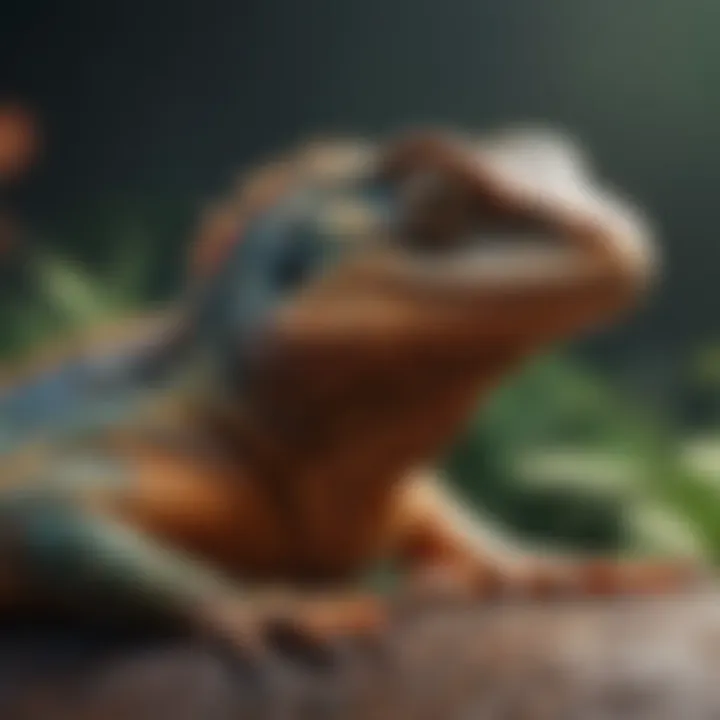
Preface to Avian and Exotic Animal Care
Understanding the intricacies of avian and exotic animal care is not just an academic pursuit; it speaks volumes about our relationship with creatures that fly, crawl, and scurry outside the realm of traditional pets. As more individuals embrace the joys and challenges of caring for these animals, we find ourselves entering a unique ecosystem where knowledge is both a privilege and a necessity. The topic is crucial, especially because each species presents distinct needs, requiring tailored approaches to ensure they lead healthy and fulfilling lives.
In the rich tapestry of pet ownership, birds hold a particularly special place. Their vibrant colors, melodious songs, and intelligent behaviors make them compelling companions. Alongside, exotic animals—whether they are colorful reptiles, playful small mammals, or enchanting amphibians—draw in a niche yet dedicated audience. Both groups require a thorough understanding of their environment, dietary requirements, and behavioral tendencies to thrive. The responsibility that comes with owning these pets can sometimes seem daunting, but once understood, it turns into an enriching journey.
Defining Avian and Exotic Species
Avian species encompass a broad range of birds, from the chatty parakeet to the majestic macaw, each requiring specific care regimens tailored to their unique needs. "Species" refers to the different categories of animals, and within avians, the diversity is astonishing.
- Common examples of avian species include:
- Budgerigars (Budgies): Small, social, and colorful, budgies are excellent starter birds.
- Cockatiels: Known for their affectionate behavior and ability to mimic sounds and whistles.
- African Grey Parrots: Renowned for their intelligence and complex vocalization.
Exotic species, on the other hand, refer to animals that don't typically fall under the category of conventional pets. They exist in various forms and each presents its own set of requirements.
- Examples of exotic species might include:
- Small mammals like ferrets and guinea pigs, which benefit from plenty of interaction and a safe environment to explore.
- Reptiles, such as bearded dragons and chameleons, that require specific temperatures and environments to thrive.
Understanding these classifications is paramount, as it guides potential owners in preparing for the commitments involved in keeping such animals.
Importance of Understanding Animal Behavior
When it comes to avian and exotic species, the importance of grasping their natural behaviors cannot be overstated. Each creature exhibits behaviors that are rooted in instinct and social interaction. Recognizing these actions can help guardians create better environments for their pets, ensuring physical and psychological well-being.
- Behavioral signs to pay attention to include:
- Social interactions: Understanding how birds communicate with each other can lead to better interactions between pets and their owners.
- Feeding habits: Many birds have unique feeding styles that can indicate their overall health and happiness.
- Signs of distress: Changes in movement or vocalization may signal health issues or stress.
"Understanding the subtleties of animal behavior is like holding a key to a door; it opens up a world where compassion and care intertwine."
For pet bird owners, aspiring bird parents, and bird breeders, a deep knowledge of avian and exotic behavior transforms them into more effective caretakers. This knowledge doesn’t just serve practical purposes; it also fosters an emotional connection that strengthens the bond between human and animal, enriching both lives.
The Diversity of Pet Birds
When considering pet birds, one quickly realizes that they come in a dazzling array of species, each with their own unique charm and flair. Understanding this diversity is more than just an academic pursuit; it has tangible implications for prospective and existing bird owners alike. The wide variety of pet birds extends from the small budgies that often act as the gateway birds for many owners, to the towering macaws that command attention with their sheer size and vibrant plumage. This section seeks to elucidate the significance of recognizing this diversity when choosing a pet bird, emphasizing how it influences care, companionship, and the overall dynamics within an owner’s household.
Each species has specific needs and behavioral traits that can greatly affect the bird's health and the owner's ability to provide satisfactory care. Therefore, a keen understanding of various types of pet birds is essential. Moreover, being aware of these differences ensures that potential bird owners are not just equipped for one breed’s demands but appreciate the broader panorama of what avian care entails.
Popular Species Among Enthusiasts
Among bird lovers, certain species emerge as perennial favorites. You might find them swinging on their perches, whistling sweet tunes, or engaging in playful antics that melt the hearts of many. Budgerigars, or budgies as they are affectionately known, top the charts for many. Their compact size and chirpy disposition make them ideal for first-time bird owners. Talking points about them include their ability to mimic human speech, which many owners find engaging.
Then there are cockatiels, known for their affectionate behavior and striking crests. These birds often thrive on interaction and socialization, making them charming companions for families or single owners.
Other popular choices include conures, which are sometimes seen as the life of the party due to their boisterous nature. Owners often revel in their playful antics and vibrant personalities.
Lastly, African grey parrots demand special mention. They are recognized for their remarkable intelligence and ability to learn an expansive vocabulary. However, due to their complex needs, they require dedicated time and understanding from their owners. Each of these species provides not just a pet, but a dynamic member of the family, each with its special quirks and requirements that an owner should be keenly aware of.
Unique Traits and Personalities
Not all birds are cut from the same cloth; they exhibit a rich tapestry of personalities and traits that can charm and challenge their caregivers. For one, lovebirds are known for their affectionate nature—not just toward their human caretakers, but among themselves as well. This can lead to heartwarming displays of bonding that leave owners captivated. However, their social nature also means that they can become distressed if kept alone.
On the other side of things, quaker parrots possess a mischievous streak; their playful nature can lead to hilarious antics, keeping their owners entertained. However, they can also be quite loud and demanding.
Moreover, the personality differences extend beyond just social behavior. Some birds, like canaries, are more introverted and thrive with less direct interaction, often preferring to sing sweetly while enjoying their solitude. In contrast, Amazon parrots are often known for their exuberance and silly antics; they tend to be vocal and engaging, sometimes requiring a more hands-on approach to care.
Understanding these unique traits and personalities can make a significant difference for potential owners. The right match between a bird's personality and an owner’s lifestyle can lead to fulfilling relationships, while mismatched expectations can bring frustration, for both bird and owner. Ultimately, a little knowledge goes a long way in fostering a companionable relationship.
Basic Needs of Pet Birds
Understanding the basic needs of pet birds is crucial, as these requirements directly impact their health, happiness, and longevity. When you bring a feathered friend home, you’re stepping into a world where their well-being depends on your knowledge and attentiveness. Therefore, ensuring that the birds thrive means paying careful attention to their dietary needs and creating a suitable habitat that fosters both physical and mental health.
Dietary Requirements
Essential Nutrients for Avian Health
The nutritional needs of pet birds are unique, as they are different from traditional pets like dogs and cats. Birds require a balanced diet that includes proteins, carbohydrates, fats, vitamins, and minerals. Grains and seeds often make up a significant part of their diet, but it’s crucial to incorporate fresh fruits and vegetables too. For instance, dark leafy greens provide essential vitamins like Vitamin A and K, which are vital for their immune function and bone health.
Birds like parrots thrive on high-quality pellets that are formulated to meet their nutritional requirements. These pellets often have added vitamins and minerals, ensuring that your pet gets everything it needs in one go. Moreover, the versatility in types of food can prevent boredom and stimulate their natural foraging behavior, contributing to their overall well-being.
Common Dietary Mistakes
Many bird owners unknowingly make mistakes when it comes to feeding their avian companions. One common pitfall is relying too heavily on seeds, which can lead to obesity and nutritional deficiencies. While seeds can be a part of their diet, they shouldn't form the bulk of it. Another mistake is not providing fresh water daily, as hydration is just as important as nutrition in supporting avian health.
To avoid these issues, it is essential to educate yourself about the specific dietary needs of your bird species. This knowledge helps create a balanced meal plan that caters to their needs, promoting a healthier, happier life. Additionally, keeping track of what they eat and monitoring their weight can indicate any potential health issues early on.
Habitat Setup and Maintenance
The environment you curate for your pet bird will have a significant impact on its quality of life. A carefully planned habitat prevents stress and encourages natural behaviors, ultimately leading to a more balanced bird.
Cage Size and Type
Selecting the right cage size and type is non-negotiable for the well-being of pet birds. A spacious cage not only gives your bird room to stretch its wings but also allows it to exhibit natural behaviors, like climbing or playing. For instance, cockatiels require a cage that is at least 24 inches in width, allowing for adequate movement.
The type of cage also matters. Wire cages with horizontal bars are often the best choice. They provide the bird with safe perches while allowing for easy interaction. However, it’s important to ensure that the bars are not too far apart, as this can be a safety hazard for smaller breeds.
Environmental Enrichment Strategies
Beyond just a cage, creating a stimulating environment is key. Birds are intelligent creatures; they often require mental stimulation to stay psychologically healthy. Incorporating toys, perches, and various activities into their cages is essential. For example, rotating different toys keeps them engaged and can prevent them from becoming bored or developing destructive behavior.
Adding natural elements, such as branches and safe plants, not only enhances their space but also mimics their natural habitat. Even simple things like changing the layout of the cage or introducing new activities can provide fresh stimulation, catering to their curious nature.
"Birds are like little actors; they need a stage to perform and show their true colors to the audience - you."
In summary, knowing and addressing the basic needs of pet birds, including their dietary requirements and habitat setup, is foundational for responsible ownership. By committing to this knowledge, bird owners not only enhance their pets’ well-being but also deepen the bond of companionship.
Health Care for Pet Birds
Proper health care for pet birds is not just a checklist of tasks, but rather it’s the foundation of a long, happy life for these vibrant creatures. Birds can be remarkably delicate, often hiding their ailments until the last minute, which makes vigilance on the part of their owners essential. Equipping oneself with the right knowledge about their health care routines can make a world of difference. It's about understanding individual needs, recognizing changes, and being proactive.
Routine Veterinary Care
Selecting an Avian Veterinarian
Choosing the right veterinarian can feel a bit like finding a needle in a haystack. Not all vets specialize in avian care, so it’s crucial to select one who understands the intricacies of bird health. An avian vet has specific training that focuses on the delicate biology and unique health risks associated with birds. Finding a vet who knows the ins and outs of avian physiology can lead to better prevention and treatment plans for ailments.
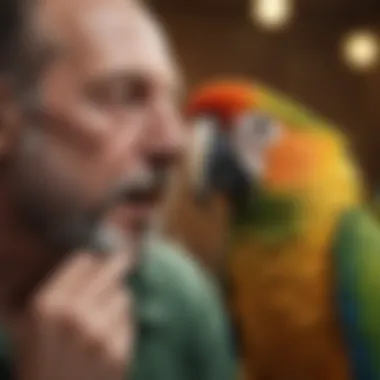
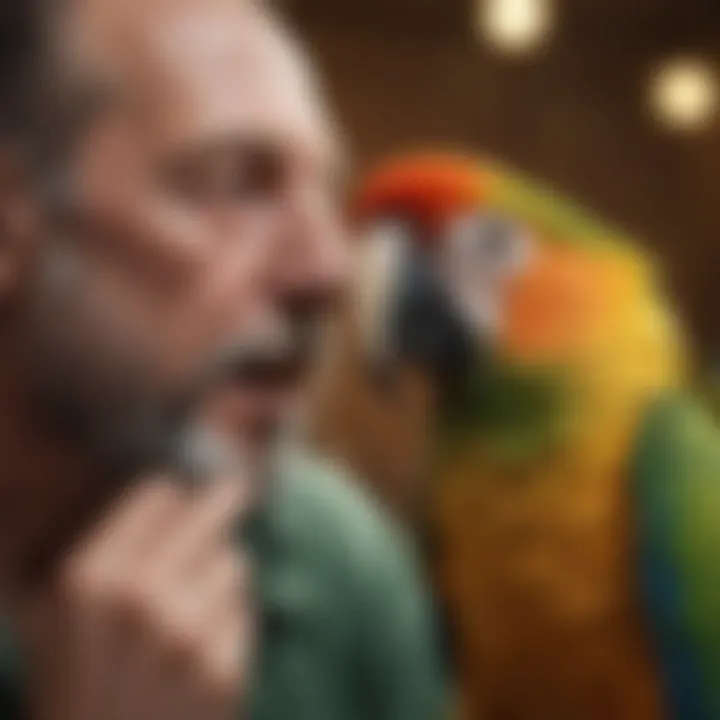
When searching for an avian vet, consider going through recommendations from local bird clubs or online forums. It’s often said, “Birds of a feather flock together,” and surrounding yourself with experienced avian owners can direct you to trustworthy professionals.
Key Characteristics of Selecting an Avian Veterinarian
- Specialization: Avian vets focus on bird species, unlike general practitioners.
- Experience with Species: Not every veterinarian has experience with all bird types, from budgies to macaws.
- Facility Quality: A vet clinic dedicated to avian care will likely have specialized equipment for diagnosing and treating birds.
The unique feature here is that proper vet care typically involves regular checkups, which can help catch issues before they escalate. It’s beneficial to foster a relationship with the veterinarian so that they become familiar with your bird's individual habits and needs.
Prevention of Common Diseases
Prevention is often more effective than treatment. This applies double for birds, as they are creatures that can mask illness exceptionally well. Vaccines, screenings, and routine checkups form the cornerstone of preventive care. It’s crucial to have a thorough understanding of diseases that can affect birds, which can range from viral infections to zoonotic diseases that can be transmitted to humans.
Key Characteristics of Prevention of Common Diseases
- Owner Education: Knowledge about signs of illness can empower bird owners to act quickly.
- Preventative Measures: Regular checkups allow for vaccinations and other preventive practices.
- Isolation Practices: Implementing ways to separate an ill bird from healthy ones can curb outbreaks, if necessary.
A unique aspect of this preventative care is that it also encompasses environmental factors, such as air quality, diet, and socialization. Ensuring all these elements are optimal can eliminate risks and only promote bird longevity.
Recognizing Signs of Illness
Recognizing subtle behavioral or physical changes is vital for early intervention. Often, owners think a shift in behavior is simply a "bad day" for their pet. However, paying careful attention to their habits can alert you to underlying health issues.
Behavioral Changes
Behavioral changes can serve as red flags, signaling that something is off. If a usually chirpy parrot becomes quiet or stops interacting, it’s a cause for concern. Changes in eating habits, such as a decrease in food intake, can also hint at underlying problems.
Key Characteristics of Behavioral Changes
- Social Withdrawal: A previously social bird may isolate themselves.
- Increased Aggression: Sometimes a bird might act out due to discomfort or pain.
- Altered Vocalization: Changes in vocal habits can suggest stress or illness.
Unique to avian care, watching for these shifts could be the difference between life and death. The quicker you identify behavioral adjustments, the sooner you can consult a vet.
Physical Symptoms
Physical symptoms can be much easier to identify than behavioral ones. Birds might exhibit signs such as abnormal droppings or feather plucking, which clearly indicate a problem that needs attention. These signs are critical in assessing their well-being and preventing potential health crises.
Key Characteristics of Physical Symptoms
- Dropping Analysis: Anomalies in droppings can indicate various health issues.
- Physical Appearance: Signs such as ruffled feathers or lethargy often suggest illness.
- Weight Fluctuation: Changes in weight can hint at both hunger issues and underlying health concerns.
The advantage here is that once these symptoms are identified, it can lead to prompt veterinary assessment. The challenge, however, lies in the fact that some symptoms can mimic other minor issues, making it imperative to keep a vigilant eye and not rely on assumptions.
"An ounce of prevention is worth a pound of cure."
This adage is particularly pertinent in avian care, where proactive health measures and attentive care can lead to vibrant and healthy companions.
Psychological Well-Being of Birds
When one brings a bird into their home, it goes beyond just feeding and keeping them in a cage. The psychological well-being of these avian companions is paramount. Birds, particularly those kept as pets, thrive not only on physical care but also on social interactions and mentally stimulating environments. It's about crafting a life for them that mirrors, to some extent, their natural behaviors. Understanding the psychological needs of birds allows owners to foster happier, healthier lives for their feathered friends.
Social Interaction and Bonding
Benefits of Companionship
Birds are inherently social creatures. In the wild, flocks are their safe havens. When they are kept alone, they can experience loneliness which can lead to behavioral issues such as biting or excessive vocalization. Companionship plays a crucial role here. Having another bird, or even a human, offers them interaction, reducing stress and promoting social behaviors. Notably, many bird owners find that their pets develop unique personalities when they have ample social contact. This social backdrop not only contributes positively to their mental state but also enhances their bond with their owner.
- Social Benefits: Companionship helps mitigate loneliness.
- Behavioral Improvement: Interaction in groups can aid in reducing negative behaviors.
- Healthier Birds: Birds that socialise regularly tend to exhibit fewer health problems.
However, not all companionship may result in positive outcomes. Introducing unfamiliar birds without appropriate gradual steps can lead to territorial disputes or conflicts. Therefore, careful planning is necessary.
Understanding Attachment
Understanding attachment in birds is fascinating. Birds can build strong bonds with their owners. They often exhibit behaviors that reflect their affection, such as preening, vocalizations, and even mimicking sounds their owners make. This attachment is instrumental for both parties, as it turns into a rewarding connection that enhances day-to-day interactions.
Just like any relationship, attachment comes with its own set of challenges. Some birds may develop anxiety if separated from their primary caregiver, which could lead to distress signals, such as screaming or feather plucking. Recognizing the signs of attachment can help in managing these feelings better.
- Positive Reinforcement: Strong bonds can result in easier training and communication.
- Emotional Support: The birds offer their humans emotional connections as well.
- Challenges: Heavy attachment may lead to anxiety if not handled thoughtfully.
Mental Stimulation Activities
As birds are intelligent animals, providing mental stimulation is just as important as social interaction. Activities that challenge their minds can prevent boredom and its subsequent problems.
Interactive Toys and Games
Interactive toys serve as fantastic tools for keeping a bird entertained. These can range from puzzles to toys that require the bird to solve challenges to uncover treats. Birds can spend hours engaged in these activities, which not only keeps them busy but also enhances their problem-solving skills. Offering a variety of toys and regularly rotating them is key to maintaining the pet's interest.
- Cognitive Benefits: Toys help sharpen their natural problem-solving abilities.
- Physical Activity: Birds enjoy moving and jumping while playing with these toys.
- Care Factors: Owners should ensure toys are safe and regularly checked for wear.
Avoid overly complex designs, as they may frustrate the bird instead of encouraging exploration.
Training Techniques
Training techniques can be crucial to the mental well-being of birds. Positive reinforcement through treats or praise can facilitate training sessions that not only teach commands but also stimulate their minds. The process of learning new tricks can be quite rewarding for both the bird and the owner, as it solidifies their bond and sparks joy in their interactions.
Training sessions also offer the opportunity to build trust. Birds learn to associate their humans with positive experiences, which furthers the emotional connection. However, it’s essential to keep training sessions short to avoid fatigue or overwhelm.
- Skill Development: Birds learn and develop skills that mimic natural behaviors.
- Bonding Opportunities: Training strengthens relationships while providing enjoyment.
- Cautions: Overdoing training can lead to stress; balance is key.
By catering to the psychological needs of our avian companions, we nurture a richer life for them, fostering a rewarding and harmonious cohabitation.
The World of Exotic Animals
The fascination with exotic animals is not merely a whim; it serves as a beacon for those seeking to expand their horizons beyond traditional pets. Engaging with exotic creatures opens the door to a myriad of behaviors, appearances, and life histories that can transform the understanding of wildlife as well as pet ownership. These animals can bring a vibrant element to a household, enhancing the lives of their owners while educating them on species conservation and diverse ecosystems. The unique nature of exotic pets expands one's perspective on animal care, fostering a deeper empathy for all living beings.
Types of Exotic Pets
Small Mammals
Small mammals, such as ferrets, guinea pigs, and hamsters, make for excellent companions due to their relatively simple care requirements and engaging personalities. For many pet owners, choosing a small mammal can be a bridge between the world of common pets and the intriguing sphere of exotic animals.
A key characteristic of small mammals is their manageable size. They don't require large living spaces, which makes them ideal for individuals or families living in apartments. Their lively dispositions bring joy, and many are known for their playful nature. For instance, ferrets are notorious for their curious behavior, often getting into small spaces and exploring their environment. This can lead to both entertainment for the owner and development of the animal's natural instincts.
However, potential owners must acknowledge the unique needs of these animals. Small mammals often require specialized diets and habitat conditions to thrive. For example, guinea pigs need a vitamin C-rich diet that is essential for their health, unlike other pets that can subsist on standard feeds. Moreover, while they can be quite delightful companions, some small mammals, like hamsters, tend to be more solitary, which might not appeal to everyone's desire for interaction.
Reptiles and Amphibians
The allure of reptiles and amphibians lies in their exotic look and unique behaviors. Species including bearded dragons, leopard geckos, and various tree frogs offer an entirely different pet experience compared to traditional feathered friends or furry creatures. Their importance in this discussion about exotic animals stems from their relatively low maintenance needs concerning companionship, coupled with fascinating behaviors that can fascinate owners of all ages.
Reptiles and amphibians often thrive in carefully controlled environments, showcasing the need for owners to become adept at habitat management. For instance, a bearded dragon requires a specific temperature gradient to regulate its body heat, which can educate owners on the complexities of temperature and humidity control. This need makes them compelling as pet choices, yet it emphasizes that prospective owners must invest in understanding these requirements thoroughly.
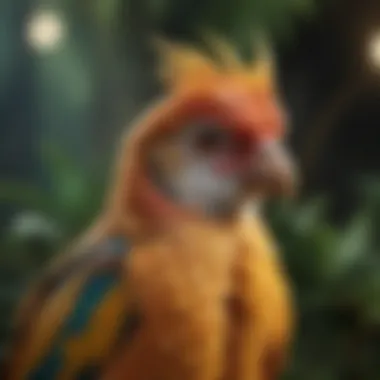
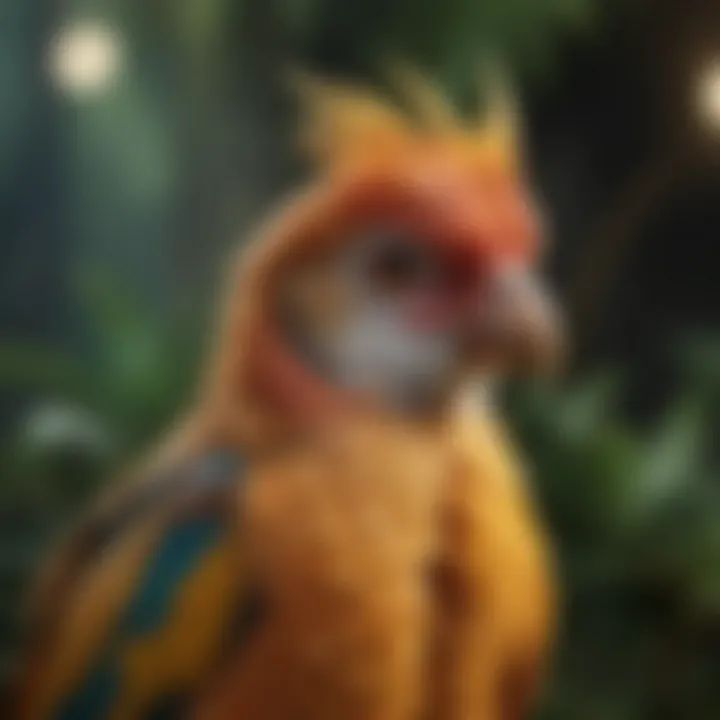
However, it's crucial to recognize the disadvantages tied to their nature. Unlike more social mammals, reptiles can be solitary and aren’t known for exhibiting affection. This can lead to a disconnect for those who wish for a more interactive relationship with their pets. Understanding the world of these creatures also involves acknowledging that many have longer lifespans, necessitating a long-term commitment.
Care Differences Between Birds and Other Exotics
When comparing the care of birds to other exotics, one must consider various factors. Birds, with their social needs and intelligence, require different mental enrichment compared to reptiles or small mammals. Where a parakeet may thrive in a bustling atmosphere filled with human interaction and playtime, reptiles might do well in quiet, more controlled environments.
Both birds and small mammals may also necessitate social companionship, while reptiles can often be kept alone without significant social needs. Recognizing these differences can guide owners in making informed decisions before bringing an exotic pet into their homes.
Understanding these contrasts enhances one's appreciation for the complex needs and behaviors of exotic pets. Tailored care can lead to well-adjusted and happy animals, making the bond between pet and owner stronger.
Owner Responsibilities
Taking on the responsibility of caring for avian and exotic animals goes beyond just aesthetics or companionship. It’s a profound commitment that demands constant attention and care. Understanding this responsibility is crucial for anyone looking to welcome a feathered friend or any exotic pet into their home. If done right, this journey can be incredibly rewarding, but it also poses unique challenges that a responsible owner must navigate.
Long-Term Commitment
Owning any pet is an investment in time and resources. Birds, for instance, can have life spans ranging significantly, some living well into their twenties or even thirties. This long-term nature means that potential owners need to prepare for the future, considering factors like lifestyle changes, financial obligations, and even family dynamics. It’s not just about wanting a pet for a passing phase; it’s about committing to their care through every chapter of your life.
One must ask, "Am I ready for this commitment?". If you travel frequently or foresee changes that may affect your ability to care for a pet, it’s vital to consider these aspects beforehand. The emotional and financial investment is considerable, and the associated responsibilities can often weigh heavily on a novice owner.
To emphasize, the long-term commitment includes certain key actions:
- Regular veterinary check-ups: Failing to keep up with these appointments can lead to undiagnosed health issues.
- Continual education: Owners should stay informed about best practices in avian care, since new discoveries and techniques frequently arise.
- Time for interaction: Birds are social creatures requiring daily engagement. Neglecting this aspect can lead to behavioral problems.
Ultimately, establishing strong routines and systems can alleviate the stress that often comes with long-term commitments. But it takes willingness and perseverance from the owner’s side.
Legal and Ethical Considerations
When considering avian and exotic animal care, recognizing the legal requirements and ethical responsibilities is non-negotiable. Regulations around exotic pet ownership can vary significantly based on your location. Before bringing any animal into your life, it’s imperative to understand the local laws regarding ownership, species restrictions, and permits that may be required.
For example, some states have strict regulations regarding the breeding or selling of certain bird species to prevent illegal wildlife trade. Ignorance of these laws not only risks financial penalties but could also result in confiscation of the animal, leading to further emotional distress for both the owner and the animal. Moreover, ethical considerations ought to guide your choices—this includes sourcing animals from reputable breeders or rescue organizations rather than from pet stores that might support unethical practices.
"Only when we embrace our responsibilities can we nurture a true bond that enriches both our lives and those of our pets."
Moreover, ethical ownership also involves understanding and respecting the natural behaviors and needs of the animal. Just as one wouldn't keep a dog in a cage for hours on end, birds deserve environments and interactions suited to their specific needs.
Key points to remember:
- Sourcing ethically: Understand where your pet comes from and avoid supporting unethical breeding operations.
- Awareness of laws: Stay informed about regulations that affect your responsibilities as a pet owner.
- Promoting welfare: Having an animal is not just a right, but a privilege that demands that their welfare comes first.
In short, embracing the ethical aspects of ownership ensures that not only do you follow the law, but you also cultivate a nurturing and respectful environment for your avian or exotic companions.
The Emotional Connection Between Birds and Humans
The bond between humans and birds is often a rich tapestry woven from shared experiences, mutual understanding, and emotional depth. Unlike traditional pets such as cats and dogs, birds exhibit a unique set of behaviors and emotions that can challenge and enrich the human-animal relationship. Recognizing the nuances of this connection can significantly enhance the caregiving process, making it vital for pet bird owners to delve deeper into their avian companions' lifeworld.
Understanding Avian Emotions
Birds, in many ways, are complex emotional beings. Their capacity for emotion is reflected in behaviors such as vocal mimicry, preening, and even their remarkable ability to form strong attachments to humans. It’s widely seen how a parrot may develop its own unique language to communicate with its owner or how a budgerigar might become anxious when its owner leaves the room.
Key elements to consider when understanding avian emotions include:
- Vocal Communication: Birds often express their feelings through a myriad of sounds. A content bird may chirp or sing, while one feeling neglected may squawk loudly or even pull out feathers in distress.
- Body Language: Unlike verbal cues in humans, birds communicate emotions through body postures and movements. An excited bird might puff up and flap its wings, while a frightened one will likely try to hide.
- Social Needs: Birds are inherently social creatures. They thrive on interaction, whether with humans or other birds. Understanding this need for companionship can greatly influence an owner’s approach to care.
By tapping into these emotional undercurrents, bird owners can foster an environment that is not just physically enriching but emotionally fulfilling as well.
Stories of Bonding and Companionship
The narratives shared by bird owners around bonding experiences serve as both a testament to the depth of avian emotions and an encouragement to others looking to build similar relationships. For instance, one can recount the story of Marge, who shared her life journey with a cockatoo named Boomer. Marge would practice daily routines with Boomer, who quickly learned to identify her cooking sounds, and would rampantly flap wings in an excited manner whenever she entered the kitchen. This became their special bonding ritual.
Likewise, there is the account of Tim and his green cheek conure, Kiwi. Tim noticed that when he was feeling down, Kiwi would shuffle closer and nuzzle his cheek with gentle affection. Such moments, while seemingly trivial, illustrate the profound emotional exchanges possible with birds.
"Birds don’t just inhabit our homes; they inhabit our hearts."
These stories serve to highlight the consideration needed in nurturing such bonds. Engaging with birds through play, teaching tricks, or simply allowing them to explore their surroundings can foster trust and affection while enriching the emotional landscape of both bird and owner.
To sum up, understanding avian emotions and fostering companionship through shared experiences is crucial for anyone interested in enhancing the well-being of their feathered friends. Through attentive caregiving, owners can cultivate a harmonious relationship that pays dividends in the form of emotional fulfillment for both species.
Challenges in Avian Care
Caring for pet birds comes with its own set of unique challenges that differ greatly from the needs of more traditional pets. Understanding these challenges is crucial for pet bird owners and aspiring bird parents. Many people may think of birds as low-maintenance pets, but in reality, they require just as much attention, love, and care as any other animal. These challenges can range from health issues to behavioral quirks, making it essential for owners to be well-versed in the specific needs of their feathered companions.
The importance of addressing these challenges cannot be overstated. With more pet owners showing interest in avian companions, the industry is evolving rapidly. With that growth comes an increased responsibility. Learning about the common issues faced by bird owners and knowing how to mitigate stress and behavioral problems ensures that these pets lead happy, healthy lives. This not only benefits the birds, but it also enhances the human-animal bond, making for a more fulfilling ownership experience.
Common Issues Faced by Bird Owners
Bird owners often encounter a myriad of issues that can affect the well-being of their pets. Some of the most common problems include:
- Poor Diet Choices: Many owners are sometimes unaware of what constitutes a balanced diet for their birds. An improper diet can lead to health complications over time.
- Cage Size and Environment: Birds, especially larger species, require ample space to move freely. Improper cage dimensions can cause stress and unhealthy behaviors.
- Health Issues: Birds can be adept at hiding illness. Routine check-ups with an avian vet can be overlooked, leading to advanced health problems.
- Behavioral Problems: Issues such as excessive vocalization, self-mutilation, and aggression can arise for various reasons, including stress, boredom, or lack of social interaction.
Being aware of these issues and their potential effects is paramount. Without attention to these details, owners may unwittingly encourage behaviors that can result in prolonged distress for their pets.
Mitigating Stress and Behavioral Problems
Reducing stress and preventing behavioral issues in birds requires proactive measures. Here are some strategies that can help:
- Enrichment Activities: Providing toys, perches, and varied environments can keep a bird stimulated. Regular interaction and playtime are equally essential.
- Consistency in Routine: Establishing and maintaining a set routine for feeding, play, and rest aids in reducing uncertainty, giving birds a sense of security.
- Social Engagement: Birds are flock animals and thrive on social interaction - be it with their human caretakers or other birds. Scheduling social time can help improve their mental well-being.
- Understanding Body Language: Every bird has its own way of communicating. Recognizing signs of stress, such as feather plucking or avoidance behaviors, allows owners to address the underlying issue before it escalates.
"Understanding a bird's needs is not just about meeting basic physical requirements. It's about recognizing their emotional and psychological needs as well."
Investing time and effort into understanding these challenges is key. Not only do these practices prevent issues before they happen, but they pave the way for a more harmonious relationship with their pet birds.
Culmination and Future Directions in Avian and Exotic Animal Care
As we wrap up the discussion around avian and exotic animal care, it becomes crucial to acknowledge the evolving landscape of pet ownership. The care of these unique creatures is not just about providing food and shelter but involves a deeper understanding of their specific needs, emotional states, and behavioral patterns. Responsible ownership is a continuing journey, where the knowledge gained continually adapts to better meet those needs.
Emerging Trends in Pet Care
In recent years, trends in pet care have shifted significantly. Bird enthusiasts are now more aware of the importance of a holistic approach to care. This includes:
- Natural Diets: Many pet owners are moving towards organic and natural diets, emphasizing fresh fruits and vegetables along with specialized pellets. This shift is in response to an understanding of how much diet impacts overall bird health.
- Technology in Care: The advent of technology also plays a role. Products such as automatic feeders, interactive toys, and even apps for tracking health and behavior patterns are gaining popularity, allowing owners to ensure their pets receive proper care even when they are busy.
- Health Awareness: Owners are adopting a proactive approach towards health, seeking regular veterinary check-ups and vaccinations, thereby reducing the risk of illness.
The Role of Community in Animal Welfare
The community plays a pivotal role in advancing the welfare of avian and exotic pets. Local bird clubs, online forums, and social media groups foster environments where owners can share experiences, advice, and support. The collective knowledge from diverse backgrounds adds immense value to individual practices.
For instance, the ability to connect with experienced bird breeders or avian veterinarians through platforms like Reddit and Facebook is invaluable. These connections facilitate:
- Shared Resources: Access to a wealth of information on diet, habitat, and behavior can often be found within these communities.
- Support Networks: New bird owners can find support and encouragement, easing the transition into responsibly caring for avian companions.
- Advocacy for Best Practices: Community-led initiatives can champion animal rights and proper care practices, creating awareness about the ethical treatment of these animals.
One cannot overlook the importance of fostering an understanding of how avian and exotic animals interact with their human companions. These connections enhance not only the lives of the pets themselves but also enrich the emotional lives of their owners.
"Responsible ownership is not merely a phrase but a commitment to understanding and nurturing the unique needs of our pets."















